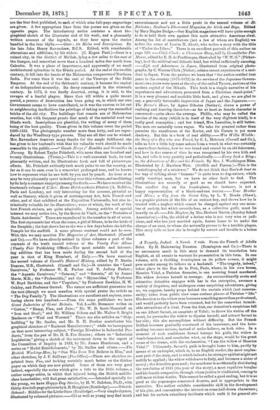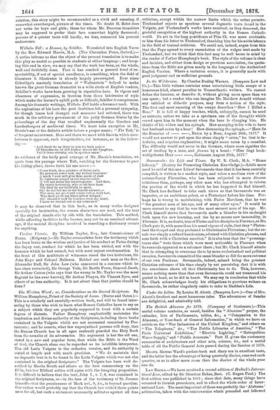A Tragedy, Indeed. A Novel. 2 vols. From the French
of Adolfo Belot. By H. Mainwaring Dunstan. (Remington and Co.)—There is no uncommon merit in this story to demand its translation into English, at all events to warrant its presentation in this form. In one volume, with a thrilling frontispiece on its yellow covers, It might pass muster among its follows on a bookstall. "The tragedy, indeed," takes place in the Rue de Is Pais, Paris, where, in his own house, Maurice Vidal, a Parisian financier, is one morning found murdered. His widow devotes herself to revenge. An extraordinarily acute and attractive detective engages with her in the enterprise, assumes a variety of disguises, and undergoes some surprising adventures, giving us, we suppose, hereby peeps behind the curtain which (not unneces- sarily) hides from public view some curious phases of Parisian "life." His devotion to the widow soon becomes something more than professional, and would probably have been returned, but for the somewhat formid- able attractions of a rival. From the first, our detective's suspicions fall on one Albert Saran, an asseciato of Vidal ; to throw his victim off the scent, he persuades the widow to diguise herself, and attract Savari to her side; this she accomplishes without difficulty. But the French Delilah becomes gradually convinced of his innocence), and the love- making becomes serious, instead of make-believe, on both sides. In a moment of rash confidence Savari betrays his guilt, the widow is dumb-foundered, and concludes what, on the stage, would be the great scene of the drama, with the exclamation, "I am the widow of Maurice Vidal !" Ultimately, Saran's guilt is brought home to him, partly by means of an underplot, which is, to an English reader, the most unplea- sant part of the story, and to which indeed a far stronger epithet might not unfitly be applied ; the widow withdraws to Italy, and becomes a sister of mercy ; the detective goes mad ; the murderer is accidentally shot during tho revolution of 1848 (the year of the story), a most repulsive burglar and his female companion, through whom justice is vindicated, coming to still more violent deaths. This cannot be called a good ending, but It is as good as the personages concerned deserve, and is appropriate to the narrative. The author exhibits considerable skill in the development of his plot, and concentrates the interest on some half-dozen characters; and but for certain subsidiary incidents which unfit it for general oir- ciliation, this story might be recommended as a vivid and amusing, if somewhat overcharged, picture of the times. No doubt M. Belot does not write for boys and girls ; those for whom Mr. Dunstan translates may be supposed to prefer their fare somewhat highly flavoured ; persons of a quieter taste will hardly, we fear, commend his present endeavours.



































 Previous page
Previous page